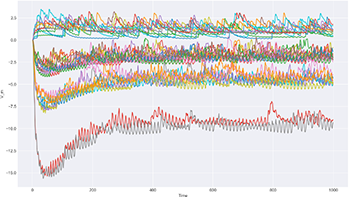Streaming Live Neuronal Simulation Data into Visualization and Analysis

Neuroscientists want to inspect the data their simulations are producing while these are still running. This will on the one hand save them time waiting for results and therefore insight. On the other, it will allow for more efficient use of CPU time if the simulations are being run on supercomputers. If they had access to the data being generated, neuroscientists could monitor it and take counter-actions, e.g., parameter adjustments, should the simulation deviate too much from in-vivo observations or get stuck.
As a first step toward this goal, we devise an in situ pipeline tailored to the neuroscientific use case. It is capable of recording and transferring simulation data to an analysis/visualization process, while the simulation is still running. The developed libraries are made publicly available as open source projects. We provide a proof-of-concept integration, coupling the neuronal simulator NEST to basic 2D and 3D visualization.
@InProceedings{10.1007/978-3-030-02465-9_18,
author="Oehrl, Simon
and M{\"u}ller, Jan
and Schnathmeier, Jan
and Eppler, Jochen Martin
and Peyser, Alexander
and Plesser, Hans Ekkehard
and Weyers, Benjamin
and Hentschel, Bernd
and Kuhlen, Torsten W.
and Vierjahn, Tom",
editor="Yokota, Rio
and Weiland, Mich{\`e}le
and Shalf, John
and Alam, Sadaf",
title="Streaming Live Neuronal Simulation Data into Visualization and Analysis",
booktitle="High Performance Computing",
year="2018",
publisher="Springer International Publishing",
address="Cham",
pages="258--272",
abstract="Neuroscientists want to inspect the data their simulations are producing while these are still running. This will on the one hand save them time waiting for results and therefore insight. On the other, it will allow for more efficient use of CPU time if the simulations are being run on supercomputers. If they had access to the data being generated, neuroscientists could monitor it and take counter-actions, e.g., parameter adjustments, should the simulation deviate too much from in-vivo observations or get stuck.",
isbn="978-3-030-02465-9"
}

